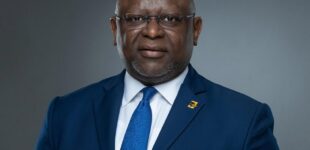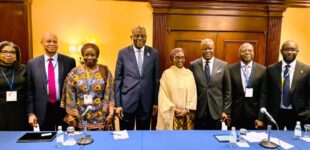LCCI: Majority of Nigeria’s debt not tied to specific projects

The Lagos Chamber of Commerce and Industry (LCCI) says majority of Nigeria’s borrowings are not tied to assets and specific projects.
Speaking with journalists on Wednesday, Toki Mabogunje, president of LCCI, said it was crucial to replace existing debts with asset-linked securities to reduce the amount of money owed by the country and ease the pressure of debt service on the budget.
According to her, the government’s penchant for issuing new debt to redeem maturing ones is not an optimal debt management strategy.
“While we acknowledge the federal government’s drive in boosting revenue mobilization via the strategic revenue growth initiative (SRGI), it is even more important for state governments to be very innovative about revenue generation,” Mabogunje said.
“We note that majority of Nigeria’s debt are not linked to assets or specific projects. As such, it is critical to create a national asset register, and have a coordinated mechanism in place for valuing and managing Nigerian assets.”
As of the end of December 2020, Nigeria’s public debt which includes the debt stock of the federal government, state governments and federal capital territory (FCT), stands at $32.91 trillion, according to the Debt Management Office (DMO).
Commenting on the recently introduced electronic call-up system of the Nigerian Ports Authority (NPA), the LCCI president said it may not provide a sustainable solution as the congestion problem at ports persists.
“Despite the laudable initiative of the electronic call up system and the initial successes recorded on its introduction, there seems to be a reversion to the old way. Many importers and exporters are expressing severe frustrations,” she said.
“The intractable traffic congestion and the persistent long queues of trucks and tankers at the Lagos ports corridors remain a major worry to the Lagos Chamber considering its adverse impact on the nation’s economy.”
She advocated for a “strong political will” to bring discipline to the entire cargo clearing and export evacuation processes.
To enhance foreign exchange liquidity, Mabogunje called for the consolidation of multiple exchange rates into a single market-reflective rate.
She lamented that despite the rally in crude oil prices, many investors in the economy are confronted with difficulties in accessing foreign exchange for importation of raw materials, equipment and some critical inputs for production and processing.
“This situation is a taking a huge toll on capacity utilisation, business turnover, sales, and profitability. Sustainability of some of these investments are currently at risk with dire implications for retention of jobs,” she added.














There are no comments at the moment, do you want to add one?
Write a comment